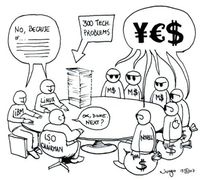
Document Freedom Day may be one of the most misunderstood days on the open source calendar.
Many who see the term probably think it relates to issues of copyright, and support for Creative Commons content. Or they may think it's an answer to The New York Times' paywall.
Neither is true.
Document Freedom Day isn't about documents, but how documents are created.

This has happened. Billions of documents written in the 20th century, using programs like WordStar, WordPerfect, or Perfect Office, are now unreadable, because those proprietary formats disappeared.
Yet many Western companies, and governments, are locked into supporting closed document formats, because for many years there seemed no alternative.
But there is.
The Open Document Format (ODF), supported by Oracle's OpenOffice, by LibreOffice, and by IBM's Lotus Symphony, among other programs, is stable, universal and rent free. The tools needed to edit ODF documents can be downloaded free. Your children and grandchildren will always have access to them.

As IBM executive Bob Sutor noted in a series of blog posts during 2007 and 2008, when Microsoft strong-armed OOXML's acceptance before the International Standards Organization, the format “was developed in a non-open manner, is ridiculously large, is technically inferior, and emerged from the Ballot Resolution Meeting with most things not explicitly resolved.”
In the end Microsoft's format was approved, which is a tragedy for people and organizations, many of whom find they can't work on common documents unless they pay to use that format. It's a default on Windows hardware. Trying to view a Web document in a developing country can become impossible.
The whole fight holds important lessons for technologists. Standards processes must be open. Approved standards must be rent-free, and their details available for inspection at all times.
Otherwise, there may still come a time when you can't read this.











“This has happened. Billions of documents written in the 20th century, using programs like WordStar, WordPerfect, or Perfect Office, are now unreadable, because those proprietary formats disappeared.”
Dana! Gross exaggerations like this statement undercut your credibility. I can’t imagine that a document in any of these formats couldn’t be transformed to a newer format by a determined user. Google lists hundreds of sites designed to do just this.
——— Rick
“This has happened. Billions of documents written in the 20th century, using programs like WordStar, WordPerfect, or Perfect Office, are now unreadable, because those proprietary formats disappeared.”
Dana! Gross exaggerations like this statement undercut your credibility. I can’t imagine that a document in any of these formats couldn’t be transformed to a newer format by a determined user. Google lists hundreds of sites designed to do just this.
——— Rick
The requirement that a user be determined to transform each document they see into a readable format is an enormous ask.
Easy access is the difference between documents that remain relevant and those that belong to history. I can still read Twain. I can’t read Chaucer.
What we’ve done through incompatible formats is turn most work done with computers over several decades into Chaucer.
The requirement that a user be determined to transform each document they see into a readable format is an enormous ask.
Easy access is the difference between documents that remain relevant and those that belong to history. I can still read Twain. I can’t read Chaucer.
What we’ve done through incompatible formats is turn most work done with computers over several decades into Chaucer.
You have a catchy site and I have learn some ideas with this. It help me understand how to what is web design. Thank you..
You have a catchy site and I have learn some ideas with this. It help me understand how to what is web design. Thank you..
Thanks for the clear and concise outline of current skills needs.
Thanks for the clear and concise outline of current skills needs.